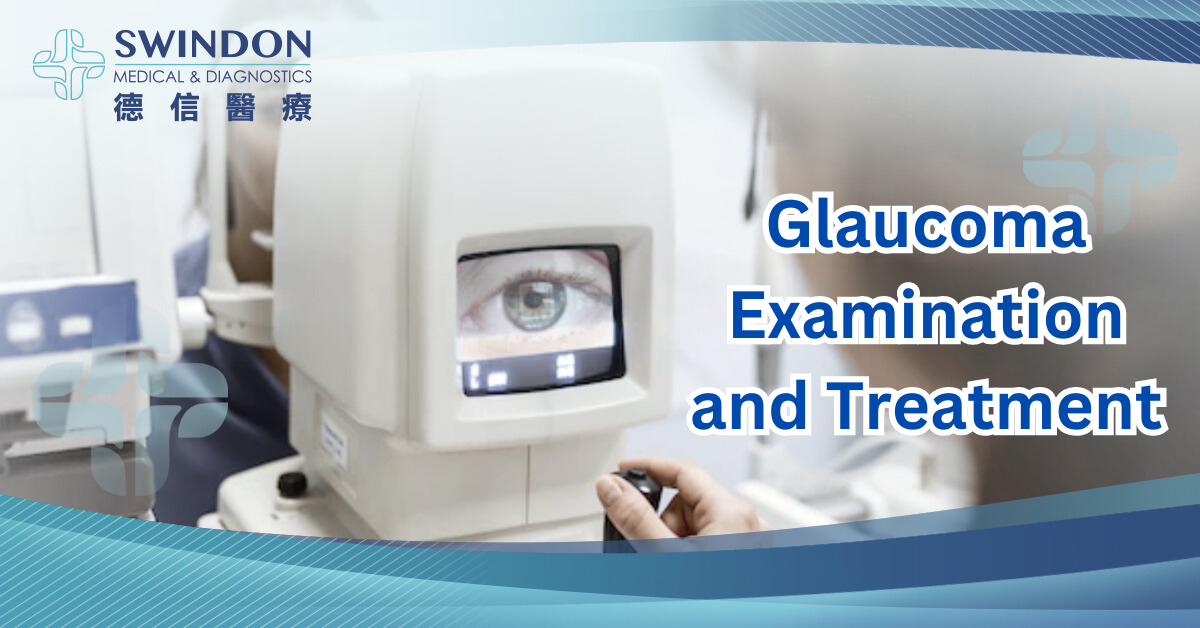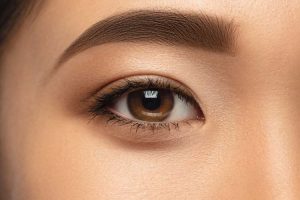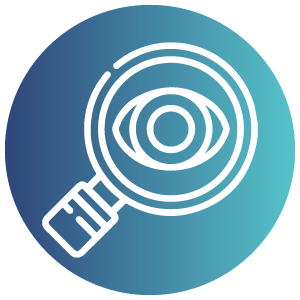
Experienced Ophthalmology Team
One-stop service covering glaucoma examination, diagnosis and treatment
Inapparent initial symptoms of chronic glaucoma
Chronic glaucoma is a form of optic neuropathy. Some glaucoma cases will lead to loss of vision. There will be no obvious symptoms in the early stage, nor there any pain or other symptoms. If there is delay in diagnosis and treatment, the damage to the optic nerve is irrecoverable. Therefore, glaucoma is also known as the “silent thief of sight”. General eye examinations in optical shops cannot reveal the visual field loss caused by glaucoma. If you have high myopia/hyperopia, sleep apnea, chronic migraine, immediate family members with glaucoma, etc., you are at high-risk for glaucoma, and should have regular eye examinations.

Silently take away your sight
Since chronic glaucoma in the early to middle stage is basically asymptomatic, many patients are only discovered when the disease develops to a later stage, and the dead nerve cells are irrecoverable. Regular glaucoma examinations and comprehensive eye examinations by ophthalmologists, including intraocular pressure measurement, fundoscopic examinations, ocular scans, visual field tests, etc. can help identify glaucoma and put it under control.
Another type of glaucoma is more obvious. Acute glaucoma is an emergency case. If the following conditions occur, the patient should undergo medical consultations and have eye examination as soon as possible, otherwise the vision may deteriorate rapidly.
If the following conditions occur, it is suggested to have an examination as soon as possible, otherwise the vision may deteriorate rapidly.
Contact us now to experience comprehensive high-quality medical care

Who is at risk for glaucoma?
-
-
Aged 40 or above (approximately 2 – 3% of people who aged 40 years old or above have glaucoma, and the probability increases with age)
-
Have a family history of glaucoma
-
Have high myopia/hyperopia
-
Diabetes
-
Hypertension
-
Cardiovascular disease
-
History of eye trauma (especially blunt trauma)
-
Long-term use of steroid
-
Sleep Apnea
-
Glaucoma Examination: Prevention better than cure
Swindon Medical has an ophthalmology specialist team to conduct comprehensive eye examinations for patients. In accordance to the past medical history and family history of the patient, a series of examinations and tests will be arranged, including vision tests, fundoscopic examinations, intraocular pressure measurement, etc. Although currently glaucoma cannot be cured or reversed, we encourage high-risk groups to undergo eye examination and diagnosis early, and coordinate with appropriate treatment, which can effectively prevent or slow down vision loss and prevent blindness.

Vision Tests
Using different procedures and devices to determine the vision level of test takers

Intraocular Pressure Measurement
Ocular hypertension can damage the optic nerve, which is the main cause of glaucoma. Tonometer is used to measure the intraocular pressure to check whether the intraocular pressure is at a normal level. If the intraocular pressure is greater than 21 mmHg, treatment may be required. Moreover, about one-third of glaucoma patients do not have high intraocular pressure, so normal intraocular pressure does not rule out glaucoma.

Optical Coherence Tomography (OCT)
OCT is a non-contact scanning. Through OCT, high-resolution eyeball structural tomography can be obtained, and the cross-section, longitudinal section and three-dimensional images of the eyeball can be pieced together, so as to assess the health status of retina, nerves, etc., and monitor glaucoma and other eye diseases.
Enhanced Diagnostic Services
The ophthalmologist team of Swindon Medical provides patients with accurate diagnosis services. We thoroughly consider the patient’s health status, family genetics, medical history, and general habits of using their eyes, etc. in detail, and then choose the best examination plan according to the patient’s conditions. According to various examinations and assessments, if abnormalities are identified, the medical team will provide further investigations, referrals and support services so that patients can receive comprehensive care.

Optimal Glaucoma Treatment for patients
The goal of treating glaucoma is to effectively control intraocular pressure and prevent or slow down the worsening of glaucoma. Swindon Medical will decide whether to use glaucoma drops, glaucoma laser surgery or other eye surgery according to the type and severity of glaucoma, as well as the medical history and physical condition of the patient. Due to the many types of glaucoma and the complicated stages of the disease, our team of ophthalmologists will conduct detailed examinations for glaucoma patients, and then suggest appropriate treatment plans, which may include drugs, laser surgery, minimally invasive surgery, or combined surgery treatments, etc., to ensure that patients receive maximum support and the best glaucoma treatment.
Why choose Swindon?
Swindon Medical is committed to being a trustworthy healthcare partner. We wholeheartedly provide our clients with professional, safe and high-quality medical services, including a series of medical diagnosis, health examinations, vaccination and specialized medical services. Swindon Medical ceaselessly pursues excellence to cater for the different medical needs of the patients.

Bringing together medical professionals
Swindon Medical firmly believes that a professional medical team is the key to providing quality services. The team includes general practitioners, medical specialists, Traditional Chinese medicine practitioners, nutritionists, physiotherapists, radiographers, and laboratory technicians to provide you with high-quality and safe medical services.

Comprehensive professional medical services
Swindon Medical provide a wide range of medical services, including medical diagnosis, vaccination, physical examinations, specialized medical care, Chinese medicine consultation, physiotherapy, nutritional counselling, skin management, etc., to provide patients with one-stop quality healthcare and prevention, diagnosis, treatment, and rehabilitation services.

In-house Laboratory
Swindon Medical has its own medical laboratory to ensure that all laboratory tests and diagnostic items are performed by professional laboratory personnel, and most of the test results can be completed within 1-2 days. Through advanced devices and testing, our customers can know the diagnosis results in the shortest possible time and get appropriate treatment as soon as possible.




